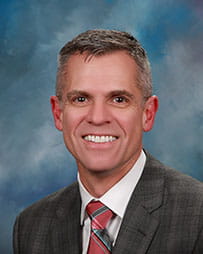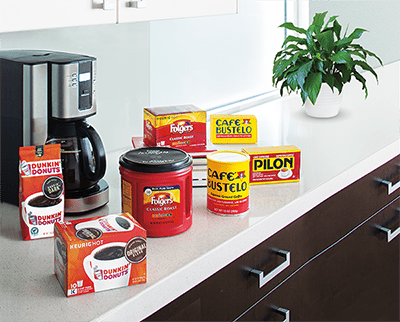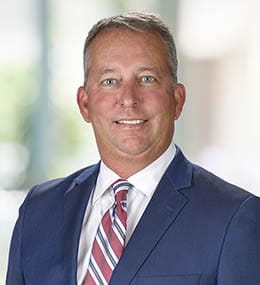The J.M. Smucker Company
Bearing Fruit in the Past, Present,
and Future
The J.M. Smucker Company
Bearing Fruit in the Past, Present,
and Future
CFO Mark Belgya speaks on his time at The J.M. Smucker Company, the company’s aggressive growth strategy, the consumer-packaged goods industry, and more.

Is there a Smucker product in your kitchen? Chances are, there is. In fact, 92% of U.S. households consume at least one Smucker item.
Founded in 1897 by Jerome Monroe Smucker in Orrville, Ohio, The J.M. Smucker Company made a name for itself with its Smucker’s® fruit spreads, which have been a staple on grocery shelves for more than a century. But there’s more to the company’s portfolio than strawberry jam. Smucker now has three core business platforms: Consumer Food, Pet Food & Pet Snacks, and Coffee. Smucker has seen tremendous growth with the addition of brands such as Folgers®, Jif®, Rachael Ray® Nutrish®, Dunkin’ Donuts®, Milk-Bone®, Meow Mix®, Robin Hood®, and several others.
As Chief Financial Officer, Mark Belgya has seen net sales increase from $650 million to $8 billion in the last 15 years. Belgya credits this success to the consistent leadership that has come from the Smucker family, which has allowed the company to remain focused on long-term growth versus today’s more common emphasis on near-term results. Smucker also has a strong commitment to corporate responsibility as demonstrated by its recent announcement that approximately 50% of the company’s electricity will be addressed by renewable energy in the near future.
Stout has acted as a strategic partner with Belgya and Smucker for the last 15 years and has an up-close view of the company’s growth, assisting them throughout many of their acquisitions. The Journal recently spoke with Belgya to discuss Smucker’s expanding product base, his 33-year tenure at the company, and what he’s learned about the consumer-packaged goods industry.
You joined Smucker in 1985. What attracted you to the company, and what was your first position? Can you talk more about your career progression and path at Smucker?
Prior to joining Smucker, I was a member of the audit staff of Ernst & Whinney, known today as EY. I knew the Smucker’s brand, but not the company. As I went through the interview process, I felt that Smucker was a great place to pursue the next chapter of my career. I was impressed by the number of executives I met during my office interviews, including Richard Smucker.
My first role at Smucker was in the Internal Audit department, and in fact, I was the company’s sole internal auditor. Smucker was much smaller in 1985. After serving in audit for nine months, I moved into the first of several accounting roles that I would hold throughout the next 15 years. Two of those years were spent in California as controller at one of our manufacturing plants. In 1997, I was offered the role of Corporate Controller and elected as an officer of the company. Subsequently, I held the Treasurer’s role. Both positions helped prepare me to become CFO in 2005.
What are some of the reasons why you’ve had such a long tenure? In your opinion, what makes Smucker a great organization to work for?
The company’s continual growth, professional opportunities, beautiful campus, and caring culture are just a few of the reasons. Most of all though, it has been the people. Throughout my career, I have been able to interact with a team that has a broad range of experiences, is technically strong, and is very collaborative. Professionally, I have been able to involve myself in many challenging transactions and situations that have offered opportunities to enhance my career. The company has transformed itself throughout the years with growth in revenue, number of brands, and overall sophistication. I have often said that it’s like I have worked at three or four different companies, without ever leaving Orrville.

In the last 20 years, the company’s product portfolio and revenue have grown significantly compared with the first 100 years. What was the impetus behind this growth strategy at such a well-established company?
The company’s growth trajectory since the beginning of the 2000s has been amazing and, candidly, required a significant change in strategic direction. Thanks to the leadership of Tim and Richard Smucker, the acknowledgement that the company could manage a larger portfolio than fruit spreads, toppings, and juices, and a willingness of the family to forgo majority ownership, the company altered its strategy early in the new millennium.
On paper, Smucker moved from a products-offered strategy to one focused on marketing brands. Coinciding with this change in strategy, we had an opportunity to acquire the Jif® and Crisco® brands from Procter and Gamble, and we completed this transaction using a newly created structure called a Reverse Morris Trust. This equity-based transaction model provided an efficient structure that significantly increased earnings and cash fl ow, without placing restrictive leverage on the company. What followed was a major acquisition approximately every three years, culminating most recently with the acquisition of Ainsworth Pet Nutrition, makers of the Rachael Ray® Nutrish® brand of pet food and snacks.
When pursuing an acquisition, what are some of the important aspects you look for in a target?
Acquisitions have played a major role in our company’s growth the past 15-plus years. Like many things we do, we approach M&A [mergers and acquisitions] as a team effort. Members of the business areas, our M&A organization, legal, human resources, and finance all are active in every transaction. When considering acquisition candidates, we focus on leading and emerging on-trend brands, but they must clear our strategic hurdle first.
We tend to emphasize North America geographically and look for areas in the store where we have scale, such as dry goods and the freezer section, notably in handheld snacks. Of course, we also have a number of financial measures that we evaluate, including return on investment and earnings-per-share accretion.
What are some of the more notable acquisitions in which you’ve been involved?
I have been involved in many acquisitions throughout the years, large and small. Looking back, the acquisition of the Folgers® coffee business in 2008 ranks at the top of my list. It allowed us to enter coffee, a very dynamic category, and became a major source of growth for the next several years. The acquisition of Big Heart Pet Brands in 2015 is also high on the list. That acquisition provided entry into the fast-growing pet category and represented the largest acquisition in the company’s history. As part of the transaction we issued our largest public debt offering to help finance the purchase price.
What are some of Smucker’s key product innovations that have come to market?
The company heightened its focus on innovation following the Big Heart acquisition, and a new Growth and Innovation organization was put in place. A key change involved focusing on fewer, but bigger ideas. Think of it as a platform approach, versus one more focused on near-in-line extensions. Recently, we brought to market the first innovations coming out of this pipeline, with the launch of 1850™ premium coffee and Jif® Power Ups™, a line of snacking products.
What are some of the things you’ve learned about the consumer-packaged goods industry during your tenure at Smucker?
Having been in the space for more than 30 years, I have seen cycles of cost management programs, private label growth, and mergers and acquisitions. One thing that does seem to be changing is the degree to which the consumer is gaining a more significant role in the manufacturer-retailer-consumer relationship. Under Mark Smucker’s leadership, we have placed a greater emphasis on better understanding our consumer. We can no longer solely launch messages aimed at the masses; instead, we need to establish deep one-on-one relationships between consumers and our brands.
Technology and how today’s consumer thinks and acts around brands is evolving. I experienced the company’s transition from a business that primarily sold fruit-based products to grocery stores, to one that participates in various categories and distributes through multiple channels such as away-from-home venues, internationally, and now through e-commerce. To meet the needs of today’s consumers, we are investing in e-commerce and consumer experience capabilities to interact more closely with them. We are also expanding the use of advanced analytics and repositioning our portfolio to focus on growth areas.
Financially, it is a strong industry. Good cash flow allows companies to act on all aspects of their strategy, including acquisitions, innovation, and enhancing shareholder value through consistent dividend growth and share repurchases.
How does Smucker handle the challenges in the consumer-packaged goods industry, such as competition from private-label products as well as competition for retail space?
Private label has a formidable presence in nearly every category in which we participate. Private label quality and branding have steadily improved. As a category leader, we need to innovate, which is one of the qualities retailers expect from leading brands. We also pay close attention to ensure pricing gaps between our brands and private labels remain reasonable. In addition to private label, we also recognize the impact that craft or startup brands are having in our industry. We recently modified our strategic vision statement to reflect the importance of emerging on-trend brands to our growth strategy.
You have several other key players on your team, including Tucker Marshall, Vice President, Finance and Angie Burick, Vice President, Corporate Controller. What are their roles in helping Smucker achieve its growth goals?
Like most things at Smucker, growth is a team effort. Tucker and Angie are two members of a very talented finance organization. Functionally, they lead many aspects of our finance organization, including corporate accounting, financial reporting, plant finance, internal audit, and our shared financial services organization. Certain of these areas represent key activities where Smucker and Stout typically work together. In addition, they, along with other members of the finance leadership team, help guide the development of the organization by overseeing mentorship programs, staff rotations, and internships.
Stout has had the pleasure of working closely with Smucker and seeing its growth first-hand over the last 15 years. What do you look for in a trusted partner like Stout?
It is important to us that a partner be knowledgeable, not only technically, but also about our industry. We rely on their professional expertise to support us and at times to challenge us. We approach each project with a common objective and utilize partners like Stout to help us achieve our goals.

In addition to your leadership roles at Smucker, you also serve on the boards of directors for Hamilton Beach Brands and Fossil Group Inc. and sit on both company’s audit committees. What is the key to wearing so many hats and managing your workload?
It can be demanding at times. But I welcome the opportunity to learn and bring ideas and concepts back to Smucker, while at that same time offering my experiences and expertise to fellow board members and company leadership. The fact that I have a strong finance team and support from Tim, Richard, and Mark Smucker to join outside boards provides me the time and opportunity to participate in these external roles. I am privileged to also serve as a board member for the Canton Museum of Art, The University of Akron’s College of Business Advancement Council, and Friends of the Summit, a not-for-profit organization that supports local public radio.
What are the first three things you do when you begin your workday?
I’m an early-morning person, so I try to get a workout in as much as possible and then catch up on what happened overnight. I start my time in the office by reviewing my calendar, “to-do” list, and other reminders. Perhaps surprising, I don’t do much work during my drive to and from the office. I have a 30-minute commute through small towns and farmlands, and I deem that hour traveling each day as “my time.”
What would be your advice to young professionals who aspire to advance in a consumer-oriented company like Smucker? How about those who are interested in pursuing finance-related roles?
Working at a consumer products company is a pleasure. Whenever I am asked where I work, I have a strong sense of pride when I say The J.M. Smucker Company. Typically, they respond with glowing comments about the company or tell me how much they enjoy their favorite product. I would encourage young people to find an employer that aligns with their beliefs and values and one that raises a similar sense of pride.
In finance, things are changing. I would strongly encourage individuals to gain an understanding of analytics and analysis techniques. The ability to problem solve and think creatively will continue to be valued skills that employers want. Financial expertise is just a component of today’s CFO. Gaining exposure to operations, risk management, investor relations, information technology, M&A, and international business will help your career track. Soft skills like interpersonal communications, an ability to think on your feet, and being a strategic thinker are also key. A little good timing and being in the right place doesn’t hurt either.






